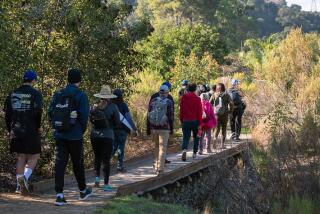$100-Million Restoration of Bolsa Chica OKd
The California State Lands Commission quickly and unanimously approved a $100-million plan to restore the Bolsa Chica wetlands Wednesday, even as a judge allowed a landowner’s lawsuit to go forward on a development proposed for the bluffs above the marsh.
The decisions Wednesday provided the latest twists in the three-decade-long tale of Bolsa Chica, once a flourishing coastal marsh that was cut off from the ocean a century ago by duck hunters and later contaminated by oil fields. Still, Bolsa Chica--meaning “Little Pocket” in Spanish--is the largest remaining wetlands complex in Southern California and a key stopover for migratory birds.
The restoration plan--approved on a 3-0 vote by the State Lands Commission--aims to turn the 1,200-acre coastal expanse of polluted salt marshes, mudflats, pools and oil rigs into a flourishing ecosystem. The plan, the most expensive wetlands restoration in state history, calls for cutting a 360-foot-wide channel through five acres of sandy beach that lie between the ocean and the wetlands, and building a traffic bridge over the channel. The resulting infusion of seawater and tidal circulation is expected to restore wildlife habitat and help several species of imperiled birds and fish.
“It took five years of hard work to acquire the land and design a restoration project that would meet environmental goals and satisfy the local community,” state Controller and commission Chairwoman Kathleen Connell said in a written statement.
The plan still needs nods from the U.S. Fish and Wildlife Service, U.S. Army Corps of Engineers, and the Santa Ana Regional Water Quality Control Board--all expected to be easily gained. Restoration work is expected to begin in 2003 and to take about three years.
However, the fate of the two-tier mesa remains at the center of an ongoing dispute.
A San Diego County Superior Court judge reversed herself, deciding to allow a lawsuit by developer Hearthside Homes and landowner Signal Landmark against the California Coastal Commission go forward.
The sister companies claim that the commission illegally “took” the property by so severely restricting what could be built that development was no longer economically feasible.
Judge Sheridan E. Reed had issued a tentative ruling in August that tossed out many of Hearthside’s and Signal’s claims, saying they had been decided in previous litigation and that the plaintiffs had not proved the commission acted improperly.
However, in Wednesday’s ruling, she said these issues were open to debate.
“We’re pleased with” Reed’s ruling, said Hearthside and Signal attorney Michael Berger. “It means that our case against the commission will go to trial.”
Peter Douglas, the Coastal Commission’s executive director, said the ruling was rife with factual errors. “I’m really puzzled by this, but our attorneys are going to have to spend time and the court is going to have to spend time dealing with issues that seem to me to be pretty clear-cut.”
More to Read
Sign up for Essential California
The most important California stories and recommendations in your inbox every morning.
You may occasionally receive promotional content from the Los Angeles Times.











